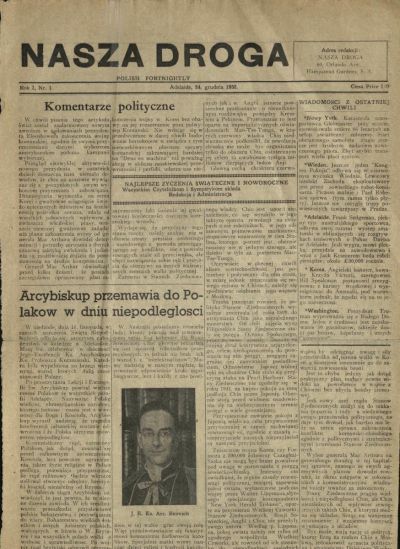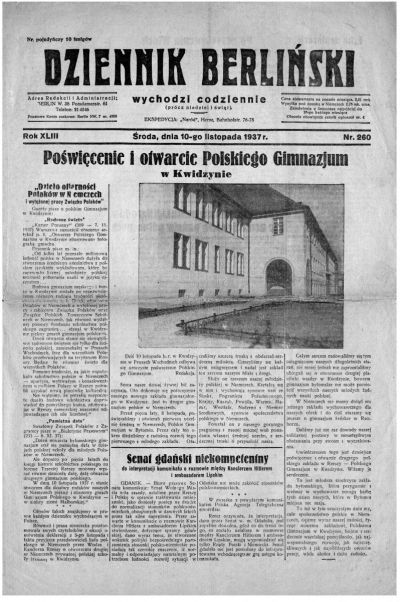“Nasza Droga” (1952-1981) – A Polish-language foreign newspaper in Adelaide (Australia) and its “German” roots

Romanowski headed up the “Nasza Droga” newspaper until May 1961. At the time Caritas, who stopped being interested in the problematic press medium after it had built its children’s home, divested the publication by selling it. The next owner, publisher and editor-in-chief was Jan Sobolewski. At this juncture, if we are to understand the further history of “Nasza Droga”, we have to look at the situation in “Polish London”, the political and organisational centre of the emigration after the Second World War. After the death of President Władysław Raczkiewicz in 1947, and the succession of August Zaleski, there were divisions and separations in the Polish government in exile, in the parties and in broad sections of the exiles, which were based more on personal ambitions than on actual political differences. It was not until March 1954, when a reconciliation facilitated by General Kazimierz Sosnowski [Polish: Akt Zjednoczenia (literally: Act of reunification)] was negotiated and President in exile Zaleski stepped down at the end of his seven-year term in office, that a government in exile seemed possible. But when Zaleski revised his decision, he triggered deep dissent which continued right up to his death in 1972 and which undermined the authority of the government in exile and compromised it in the eyes of the Poles living in exile. Most parties, the large majority of the political and social groups, and the public opinion in exile, spoke out against the “Castle” [Polish: “Zamek”] as the group around President Zaleski and the government convened by him was referred to. This resulted in the founding of alternative institutions, such as the Council of Three [Rada Trzech], to which General Władysław Anders, the former premier Tomasz Arciszewski and ambassador Edward Raczyński belonged, the Executive of the National Association [Egzekutywa Zjednoczenia Narodowego], which acted as government, and the Provisional Council for National Unity [Tymczasowa Rada Jedności Narodowej], which represented the parties and the exile associations.
The disappointment about the breakdown of the attempts to reach an agreement and the growing displeasure towards the representatives of the government in London that resulted were also expressed by the Polish immigrants in Australia, whose experiences, attitudes and convictions from the war and post-war periods formed a bond between them, which also meant that they fostered relationships with Polish emigrants in Great Britain and other centres of Polish emigration after the Yalta Conference. During this period in which the government in exile was dismantled, Jan Sobolewski emerged as an ardent follower of President August Zaleski. When the latter died and Stanisław Ostrowski took over the office of President whilst the “Castle” group joined with the Council of Three, he supported Juliusz Sokolnicki, who ignored the union of the two political forces, appointed himself “President of the Free Poland in Exile” [Prezydent Wolnej Polski na Uchodźstwie] and appointed Sobolewski as Information and Propaganda Minister and then as Prime Minister (May 1980 to February 1981). The way the new publisher of “Nasza Droga” behaved and the good personal contacts to the Polonia community that were lost and that were so important for the publisher of an emigrant newspaper, had a negative impact on the fate of the newspaper and led to the loss of its acceptance. Although Sobolewski gave the newspaper the new subheading “The Newspaper for Poles in Australia”, “Nasza Droga” became more and more removed from the reality in which the Polish immigrants in this country lived. The lack of journalistic capability of its publisher also had an impact on the standard and the attractiveness of the newspaper. Added to this were the many conflicts with third parties, for example with the editorial team at the Sydney paper “Wiadomości Polskie” [Polish News], which was accused of accommodating Communism, which scared off its readers. Nevertheless, “Nasza Droga” still played an important yet diminishing role for the Poles in Adelaide in the 1960s. Articles for the newspaper at the time were written by Stanisław Gotowicz (responsible for “Current affairs from the organisation and from community life“) and Father Kuczmański as the provider of “Ecclesiastical news”. Stefan Nowicki also sent texts from Melbourne on emigration policy. Mieczysław Iwańczak worked as a correspondent in Sydney. In 1966, the Union of Poles in South Australia began with a supplement in the weekly Melbourne newspaper “Tygodnik Polski” [Weekly Polish Paper] entitled “Polak w Adelajdzie” [A Pole in Adelaide]. From 1967, the much read “Biuletyn Organizacyjny Millenium” [Millennium Bulletin] appeared on the ground, later under the title “Biuletyn Głos Millenium” [Bulletin. The Voice of the Millennium Community].[13] From 1977, the Federation of Polish Organisations in South Australia [Federacja Organizacji Polskich w Australii Południowej] published the daily newspaper “Słowo Polskie“ [Polish Word].
[13] Szczepanowski, Marian: Biuletyn Millenium [Millennium Bulletin], in: Szczepanowski, Marian (publ.): Polski Ośrodek Millenium Enfield [Millenium Enfield Polish Centre], Adelaide 1981, p. 62-86.


